|
|
|
Sort Order |
|
|
|
Items / Page
|
|
|
|
|
|
|
| Srl | Item |
| 1 |
ID:
180095
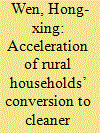

|
|
|
|
|
| Summary/Abstract |
This study investigated the existence of peer effects in the diffusion of clean cooking fuels among rural households in China and identified the mechanisms by which these peer effects were enacted from the perspective of social networks. We observed greater adoption of clean cooking fuels in areas in which adoption was already relatively high, however, this peer spill-over decreased over time and was regulated by the accessibility and strength of social networks. Specifically, if a household's social circle was more extensive or its communication with neighbours, relatives, and friends was closer, its choice of a clean cooking fuel was more likely to be affected by its peer groups. To stimulate stronger peer spill-over, we suggest that interventions such as strengthening social interactions across rural households should be included in the government's strategy to help more households convert to cleaner cooking fuels.
|
|
|
|
|
|
|
|
|
|
|
|
|
|
|
|
| 2 |
ID:
180110


|
|
|
|
|
| Summary/Abstract |
Given the growing severity of particulate matter (PM) and greenhouse gas pollution, the Korean government recently began supporting the use of eco-friendly vehicles, such as electric vehicles and hydrogen fuel cell vehicles. However, the uptake of these vehicles has been slower than anticipated because of the high purchase price and lack of infrastructure. Therefore, the Korean government has eased restrictions on liquefied petroleum gas (LPG) vehicles to encourage the vast majority of consumers to purchase LPG vehicles, expecting that they will serve as a stepping stone to switch from internal combustion engine vehicles to their eco-friendly counterparts. However, there have been only a few studies on consumer preferences for LPG vehicles in consideration of this amendment. To analyze consumer preferences for all fuel types, including LPG, this study used a discrete choice experiment combined with a reference-dependent model. The results showed a loss aversion tendency and asymmetric preferences among consumers with regard to vehicle choice. Based on these results, a simulation analysis was conducted to predict the future market share and PM pollution level. The findings indicated that the government's LPG vehicle deregulation policy could achieve positive PM reduction effects in the short term but none in the long term.
|
|
|
|
|
|
|
|
|
|
|
|
|
|
|
|
| 3 |
ID:
180092


|
|
|
|
|
| Summary/Abstract |
Over the next three decades, it is likely that on the order of 100 U.S. nuclear power reactors—almost the entire U.S. nuclear fleet, which at its peak in 1990 operated 112 commercial reactors—will be shut down and decommissioned. Decommissioning is a costly, time-consuming process that involves removing or decontaminating all radioactive infrastructure and related materials on site to prevent risks to public health so that the land can be safely used for other beneficial purposes. Though federal regulations have required that plant licensees prepare financially for this eventuality, we argue that particularly in light of commonly used corporate structures designed to strictly segregate financial risks, and under the current energy market conditions, the financial regulations in place may be insufficient in some exigent situations to ensure successful decommissioning. We explore available options for legal recourse if funding is inadequate in a corporate law context and pursuant to existing federal law. We comment on the possibility that taxpayers might be required to shoulder all or part of the financial liability at “legacy” plants in the absence of structural changes.
|
|
|
|
|
|
|
|
|
|
|
|
|
|
|
|
| 4 |
ID:
180105


|
|
|
|
|
| Summary/Abstract |
With the promotion of the concept of green development on a global scale, various industries are pursuing high profit returns while also considering the harmony between human and nature. Green finance is put forward under this background. In this paper, 815 green finance and energy policy literatures are retrieved from the Web of Science database. We first carry out descriptive statistical analysis, including the overall growth, publication sources, research regions and high-level scientific research institutions. After that, we conduct clusters analysis to find the research hotspots in recent years and point out the research trends in the future. Important journals, scholars, research findings and future research focuses of green finance and energy policy are identified in this paper. The purpose of this paper is to promote the research and discussion of green finance, and to conduct a clear policy-related discussion on its impact on the energy field. Four possible green finance-related energy policies are also summarized. This research facilitates a systematic and comprehensive understanding of green finance and energy policy research, and offers that green bonds, government subsidies and carbon dioxide emissions are the research opportunities in the future, and further research can be done by combining Fintech, big data and blockchain.
|
|
|
|
|
|
|
|
|
|
|
|
|
|
|
|
| 5 |
ID:
180098


|
|
|
|
|
| Summary/Abstract |
The path towards light-duty vehicle electrification promises benefits like lower costs for drivers and reduced environmental externalities for all. Incentives such as electric vehicle rebates assist with alleviating high capital costs of alternative fuel cars. We uncover distributional effects of plug-in electric vehicle rebates, focusing on a program in the State of California. We use economic attributes representative of populations of census tracts as well as data on rebates distributed to plug-in electric vehicle buyers through the Clean Vehicle Rebate Project from 2010 to 2018. Horizontal and vertical equity measures are evaluated, while measurement of spatial association characterizes spatial patterns of rebates allocation across the State. We evaluate the distributional fairness of rebates allocation between income groups and disadvantaged communities. We find that rebates have been predominantly given to high income electric vehicle buyers. However, the share of rebates distributed to low-income groups and disadvantaged communities increased over time and after an income-cap policy was put into effect. Spatial analysis shows high spatial clustering effects and rebates concentration in major metropolitan regions. We reveal neighborhood effects: communities with lower median income or disadvantaged receive higher rebate amounts when these are geographic neighbors to clusters characterized as high rebate amount receivers.
|
|
|
|
|
|
|
|
|
|
|
|
|
|
|
|
| 6 |
ID:
180111
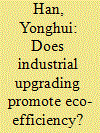

|
|
|
|
|
| Summary/Abstract |
Industrial upgrading plays a significant role in promoting eco-efficiency, but existing studies ignore this aspect. Using improved and comprehensive measures of eco-efficiency, we assess how industrial upgrading influences the eco-efficiency of a certain province with provincial panel data during the period 1998–2017. We find that industrial upgrading significantly promotes eco-efficiency and yields significantly positive spatial spillover effects. Our findings provide empirical evidence that the government should push forward industrial upgrading decisively, as well as strengthening inter-regional and central-provincial collaboration in promoting eco-efficiency.
|
|
|
|
|
|
|
|
|
|
|
|
|
|
|
|
| 7 |
ID:
180106
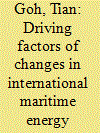

|
|
|
|
|
| Summary/Abstract |
Emissions have been a critical concern for the shipping sector, calling for climate mitigation measures to be implemented in this field urgently. It is therefore useful to understand the factors that influence the relevant empirical trends so that policies can be better tailored to address the climate challenges. Given the high reliance on fossil fuels, this paper has focused on the energy consumption from international shipping, by examining 6 factors across product types and shipping routes. This is based on comprehensive microdata of almost all vessels in the world over 2014–2017. The study finds that improvements in energy intensity is consistent across product types and shipping routes, reinforcing the importance of energy efficiency as a key climate mitigation measure. However, shifts in freight transport activity across different regions have offset gains in energy efficiency and was the most dominant factor contributing to an increase in energy consumption. Monitoring of the transport structure effect is critical for progress tracking and the potential of this effect to alter energy consumption should also be factored into emission projections.
|
|
|
|
|
|
|
|
|
|
|
|
|
|
|
|
| 8 |
ID:
180103


|
|
|
|
|
| Summary/Abstract |
In 2012 Pennsylvania's legislature increased the unconventional natural gas (UNG) well-to-building setback requirement from 200 ft to 500 ft through Act 13. To evaluate this policy, we identified all setback incident locations where a UNG well was within 500 ft of a building both before and after the implementation of Act 13. Using an interrupted time series design, we found that Act 13 did not significantly alter how wells were sited in relation to nearby buildings. Of the 1042 wells that contained a building within 500 ft – equating to ~10.1% of UNG wells (n = 11,148) and ~14.7% well pads (n = 479) – a total of 371 well setback incidents occurred after Act 13, likely due from the existing well pad exemption (35%) and a combination of landowner consent and regulatory variances rather than encroaching building construction. Overall, our study suggests that exemptions are an important and underappreciated aspect of oil and gas well setback rulemaking and highlights the relevance of other health-protective regulatory tools often promulgated alongside setbacks. New or amended setback regulations should revisit exemption procedures and where warranted, impose additional mitigation measures to ensure setback regulations provide adequate protections for health and safety as intended.
|
|
|
|
|
|
|
|
|
|
|
|
|
|
|
|
| 9 |
ID:
180109


|
|
|
|
|
| Summary/Abstract |
Although the European Union sets common objectives, each member country is in charge of its own energy policy. An exhaustive analysis of the power generation mixes of the EU member countries from 1990 to 2017 has revealed strong disparities in the evolution of their structure. Using key performance indicators, the paper analyzes the current situation in terms of carbon intensity, dependence, vulnerability and energy transition dynamics. The paper focuses on the transition dynamics for 12 emblematic EU countries. It is worthwhile to note that most of these countries have managed to reduce the carbon intensity of their electricity. The analysis revealed, for some countries, an empirical relationship between imports and the carbon intensity of power generation. The increase of the share of renewable energies induces a dependence of a country on its neighbors as long as a massive storage of electricity is not available. The increased electricity trade with neighboring countries induce costs and benefits. Only countries that have invested heavily in hydro and nuclear power benefit from both a low-carbon electrical production mix and a low dependence on imports. Finally, the paper suggests some avenues for public policies in the energy field.
|
|
|
|
|
|
|
|
|
|
|
|
|
|
|
|
| 10 |
ID:
180096
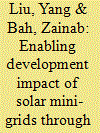

|
|
|
|
|
| Summary/Abstract |
Renewable energy based mini-grids offer a critical solution for universal access to energy in sub-Saharan Africa. We conduct a survey in rural Sierra Leone to measure the perception of local beneficiaries of two solar mini-grid projects vis-à-vis renewable energy potential, community engagement and poverty alleviation. By applying a simple mediation model, we find that the community engagement plays a significant role of chain of influence between renewable energy and poverty reduction - each 1% increase in the perceived renewable energy potential can lead to a 0.195% increase in the perceived poverty reduction, resulting from the community engagement. This mediating effect of the community engagement accounts for around 60% of the total effects of renewable energy on poverty reduction. These findings suggest that empowering the community is essential to creating electricity demand and delivering development impact of renewable energy based mini-grids in the deep poverty context.
|
|
|
|
|
|
|
|
|
|
|
|
|
|
|
|
| 11 |
ID:
180108
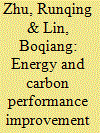

|
|
|
|
|
| Summary/Abstract |
The mining industry is one of the basic industries in China that ensures energy security. However, the mining industry's energy consumption is huge. It is, therefore, significant to improve the mining industry's energy and carbon performance. This paper adopts the non-radial directional distance function (NDDF) to measure the energy and carbon performance (ECP) of China's mining industry. It uses the metafrontier Malmquist index (MML) to disassemble the mining industry's ECP into three components to explore the driving factors during the 11th and 12th five-year plan. The empirical results reflect that although the mining industry's ECP is improved during two plan periods, technological progress does not have an obvious contribution to the ECP improvement. This means the mining sector lacks the innovation effect. As for policymaking, the government should support the mining sector's technological innovation, reduce surplus capacity, and open mineral markets.
|
|
|
|
|
|
|
|
|
|
|
|
|
|
|
|
| 12 |
ID:
180102


|
|
|
|
|
| Summary/Abstract |
The low adoption rates of modern bioenergy systems in the rural areas of Zambia indicate shortcomings within the existing institutional arrangements for a conducive enabling environment for their deployment. To address them, this study employed the SWOT–AHP (Strengths, Weaknesses, Opportunities, Threats-Analytic Hierarchy Process)-TOWS (Threats, Opportunities, Weaknesses, Strengths) technique to assess the effectiveness of such arrangements by building on the insight of the identified stakeholders. This led to the generation of ideas for further policy development for rural-based bioenergy systems. The SWOT-AHP analysis shows that the negative aspects (weaknesses and threats) associated with the enabling environment for the promotion of rural-based bioenergy systems dominate their positive counterparts (strengths and opportunities). Among others, the following policy considerations are vital to the enhancement of the enabling environment in this context: (1) building relevant policy actors' analytical capacity in biomass supply chains for cooking and heating fuels, (2) seeking developed-country support for the effective transfer of bioelectricity technologies, and (3) developing a framework used in planning for the sustainability of rural-based bioenergy systems. To increase the likelihood of their adoption, these strategies must be aligned with the country's higher-level national development goals.
|
|
|
|
|
|
|
|
|
|
|
|
|
|
|
|
| 13 |
ID:
180104
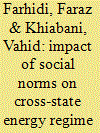

|
|
|
|
|
| Summary/Abstract |
We present a survey study that explores two experimental analysis: first, a cross-country norms effect on petition signing, and second, a cross-state comparison, focusing on clean energy adaptation instead of fossil fuel energy. In the first study, we use energy consumption information from the US, EU, and China. Using the first study as a pilot, we redesigned the second experiment by providing energy utilization for Arizonian and New Mexican to validate our norms by comparing their states' green energy consumption to the pioneer states separately. The results of the research point out that social norms can effectively influence the participants in different angles. The attendants are more likely to sign a petition—by seven percent—in favor of clean energy act when they have been provided with additional information. This research highlights that not only social norms could be compelling individuals’ behavior, but also that they are sensitive to the types of information which are disclosed to them.
|
|
|
|
|
|
|
|
|
|
|
|
|
|
|
|
| 14 |
ID:
180101
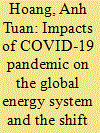

|
|
|
|
|
| Summary/Abstract |
Being declared a global emergency, the COVID-19 pandemic has taken many lives, threatened livelihoods and businesses around the world. The energy industry, in particular, has experienced tremendous pressure resulting from the pandemic. In response to such a challenge, the development of sustainable resources and renewable energy infrastructure has demonstrated its potential as a promising and effective strategy. To sufficiently address the effect of COVID-19 on renewable energy development strategies, short-term policy priorities should be identified, while mid-term and long-term action plans should be formulated in achieving the well-defined renewable energy targets and progress towards a more sustainable energy future. In this review, opportunities, challenges, and significant impacts of the COVID-19 pandemic on current and future sustainable energy strategies were analyzed in detail; while drawing from experiences in identifying reasonable behaviors, orientating appropriate actions, and policy implications on the sustainable energy trajectory were also mentioned. Indeed, the question is that whether the COVID-19 pandemic will kill us or provide us with a precious lesson on future sustainable energy development.
|
|
|
|
|
|
|
|
|
|
|
|
|
|
|
|
| 15 |
ID:
180093


|
|
|
|
|
| Summary/Abstract |
We analyze liquidity costs on continuous and auction-based intraday power markets using a cost-of-round-trip measure that works for both market designs. We use data from the Italian auction-based intraday market and the German continuous market and present descriptive statistics as well as multivariate regression models to analyze determinants of liquidity costs in both markets. To test for differences in liquidity due to market design, we employ a double machine learning technique controlling for several confounding variables. We show that weekly patterns, yearly seasonality, electricity demand, as well as the influence of temperatures significantly affect liquidity costs. Comparing liquidity costs in both market, we find that, overall, liquidity costs are lower on the Italian market. However, Italian costs increase towards later auctions, while the costs on the German continuous intraday market decrease and reach their low close to physical delivery, where costs are lower than on the last Italian market trading the corresponding products.
|
|
|
|
|
|
|
|
|
|
|
|
|
|
|
|
| 16 |
ID:
180094
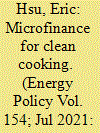

|
|
|
|
|
| Summary/Abstract |
Liquidity constraints are a key barrier to acquisition and sustained use of clean household energy in resource-poor settings. This study evaluates a pilot microfinance initiative in Kenya to help low-income rural households access liquefied petroleum gas (LPG) for cooking. Program beneficiaries received a six-month loan that covered all equipment costs and was to be repaid in monthly installments. We present results from surveys of beneficiaries (n = 69) after they began using LPG, as well as 332 non-beneficiaries from the same community (to understand how beneficiaries and non-beneficiaries differ in cooking patterns and socioeconomic outcomes). 94% of beneficiaries had repaid their loan in full and on time at the time of data collection. Meanwhile, beneficiaries were more likely than non-beneficiaries to use LPG as their primary cooking fuel (76.8% of beneficiaries versus 38.8% of non-beneficiaries). While 81.1% of beneficiaries who used LPG as their primary cooking fuel reported multiple fuel use, we find beneficiaries increased LPG use by 5.9 h per week with a corresponding decrease of 4.8 h in weekly use of biomass fuel. Our findings suggest that promoting LPG usage through microloans for equipment is likely to be both commercially viable and beneficial to health through decreased use of polluting biomass fuel.
|
|
|
|
|
|
|
|
|
|
|
|
|
|
|
|
| 17 |
ID:
180090
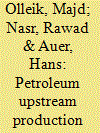

|
|
|
|
|
| Summary/Abstract |
Developing countries endowed with petroleum resources face various challenges in balancing their economic development needs and their contribution to combating climate change. They aim at increasing their reliance on renewable energy; however, they are faced with regulatory, financial, technical, and knowledge-related barriers. Many oil and gas companies started to transition from their core business in oil and gas to the wider energy field. In this paper, we show how the most common contractual arrangement between developing countries and oil and gas companies - the Production Sharing Contract (PSC) - can be modified to include renewable energy elements. We introduce a Renewable Contribution parameter that defines the share of the company profit petroleum that should be re-invested in renewable energy in the host country and we develop an optimization model that defines the state objective function and constraints. We apply the modified PSC to the case of Lebanon after populating various oil and gas and renewable energy scenarios. We show that a limited Renewable Contribution of 10% can provide a large share of the investment needs of the renewable energy sector and can contribute to emission reduction, economic development and job creation while providing companies with attractive economic incentives.
|
|
|
|
|
|
|
|
|
|
|
|
|
|
|
|
| 18 |
ID:
180091


|
|
|
|
|
| Summary/Abstract |
Canadian hydropower resources offer a potentially attractive option for meeting decarbonization targets in the US Northeast region, where there are ambitious climate goals and nearby hydro resources in Quebec. Existing transmission capacity is, however, a limiting factor in expanding hydropower imports to the region. To examine the value of expanding transmission capacity from Quebec to the Northeast, we employ an integrated top-down bottom-up modeling framework (USREP-EleMod). This research was part of an Energy Modeling Forum effort, EMF34, with a goal of better characterizing linkages in energy markets across North America. The scenarios we examine exogenously expand transmission capacity by 10, 30, and 50% above existing capacity into the US Northeast (New York/New England), finding the value to the economy of these expansions ranging from $.38-$.49 per kWh imported into New York, and $.30-$.33 per kWh imported into New England by 2050. The scenarios include economy-wide emissions goals these states have set for themselves. The carbon limits we imposed raise fuel prices more than electricity prices and as a result we found greater electrification in the US Northeast region from 2030 onward, a result that one would not see using just an electricity sector model, demonstrating a main hypothesis of EMF34, that models that looked at more integration across energy markets would give deeper insight than more narrowly focused models.
|
|
|
|
|
|
|
|
|
|
|
|
|
|
|
|
| 19 |
ID:
180097


|
|
|
|
|
| Summary/Abstract |
Local authorities in the United Kingdom are recognised by central government as key agents to achieving the national net zero target aimed at stabilising global temperatures at or below 1.5 degrees in line with the Paris Climate Agreement. Since 2018, over 75% of local authorities have declared climate emergencies committing to achieving net zero greenhouse gas emissions. This paper presents the findings of a review of official public records published by 308 local authorities, City Regions and Combined Authorities declaring climate emergencies. Significant variability and ambiguity were found in their scope of commitment, delivery planning arrangements and funding plans. Few local authorities have embraced the concept of Citizens’ Climate Assemblies as a way of engaging civil society. A follow-up review showed that although there is near uniformity of political desire to tackle climate change, action planning is very much work in progress with tight delivery timelines for the majority, significant divergence in approaches, and an unclear role for the citizen. The research concludes that without a local-authority specific Net Zero duty and well-designed and financed delivery models, local authorities will choose their own routes and finishing lines shaped by a complex ecosystem of internal and external factors. A governance framework is proposed based on the concept of local area climate contracts to bring together national and local Net Zero ambitions.
|
|
|
|
|
|
|
|
|
|
|
|
|
|
|
|
| 20 |
ID:
180099


|
|
|
|
|
| Summary/Abstract |
Four interpretations of the EU's energy transition can be identified in Russia's political discourse in 2014–2019 based on the matrix that combines realist and liberal approaches to energy relations and the denial or recognition of climate change. The cross-cutting idea of these interpretations is that Russia follows the market logics, whereas the EU either politicises energy relations or chooses economically unreasonable options. Most Russian actors advance all four interpretations in parallel. A liberal interpretation, which recognises climate change, became dominant towards the end of the examined period. Two main policy options are shaped by Russia's political discourse on the EU's energy transition: maintaining the status quo in EU-Russian gas trade and diversifying Russia's export markets. Russia's political discourse reveals a strong ideational difference with the EU on future energy policies, and Russia poorly engages with the EU's post-2030 planning. It is recommended that the EU improve its energy transition communication with Russia, and Russia is advised to enlarge the range of its policy options by better engaging with the EU's long-term energy planning. Russia and the EU also must examine energy transition in the broader context of their relations. Practical project-based cooperation can contribute to ideational convergence between the EU and Russia on future energy policies.
|
|
|
|
|
|
|
|
|
|
|
|
|
|
|
|
|
|
|
|
|